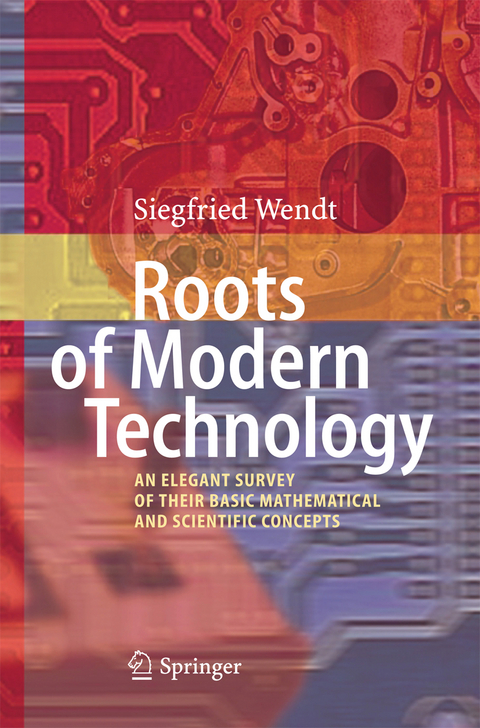
Roots of Modern Technology
Springer Berlin (Verlag)
978-3-642-43111-1 (ISBN)
If the ancient Greek philosopher Socrates came to life again today, he would wonder how airplanes fly and light bulbs glow, but not wonder much about the world's political and social changes that took place since his time. The author puts himself in the position of explaining to Socrates the technological fundamentals behind all our modern conveniences . Since he takes Socrates seriously, the author accepts the challenge of introducing the relevant mathematical and technical concepts, and he does so in a remarkably easy-tounderstand and accurate way. The result is a comprehensive overview of the elements of our technical civilization, an overview properly based upon elementary but solid mathematical and scientific principles. Everyone with an inclination toward science and technology can take advantage of the clear structure, the comprehensive presentation and the many wonderfully-illustrated examples of the book.
iegfried Wendt, 1940 geboren, studierte Elektrotechnik mit dem Schwerpunkt Nachrichtentechnik an der Technischen Hochschule Karlsruhe und schloss sein Studium 1964 mit dem Diplom ab. Er blieb bis 1969 als wissenschaftlicher Assistent in Karlsruhe und promovierte 1968 zum Dr.-Ing. mit einer Arbeit über neuronale Netze. 1969 wurde er Assistant Professor an der State University of New York in Buffalo, USA. 1972 folgte er einem Ruf an die Universität Hamburg, wo er bis 1975 das Gebiet Technische Informatik vertrat. Danach war er bis 1999 Professor für Digitale Systeme im Fachbereich Elektrotechnik der Universität Kaiserslautern. Ab 1998 baute er im Auftrag eines privaten Stifters in Potsdam ein Institut für Softwaresystemtechnik (Hasso-Plattner-Institut) auf. In diesem Zusammenhang wurde er 1999 an die Universität Potsdam berufen. 2005 trat er in den Ruhestand. Wendt hat über mehrere Jahrzehnte die Fragen der Effektivität und Transparenz industrieller Softwareentwicklungen erforscht und gelehrt. Auf ihn geht die Innovation des Fundamental Modeling Concept (FMC) zurück.
Explaining Modern Technology.- Explaining Modern Technology.- I: Fundamentals of Mathematics and Logic.- Mathematicians Are Humans Like You and Me - They Count and Arrange.- Mathematicians Are Nothing Special - They Draw and Compare.- When It Helps to Ignore Any Meaning.- About the Methods for Computing the Future.- What Talking and Writing Have in Common.- II: Fundamentals of Natural Sciences.- What the Moon Has to Do with Mechanical Engineering.- How Albert Einstein Disregarded Common Sense.- How a Few Frog Legs Triggered the Origin of Electrical Engineering.- Small, Smaller, Smallest - How the Components of Matter Were Found.- How the Difference between Particles and Waves Disappeared.- How "Recipes" in the Cells of Living Organisms Were Found and Can Be Rewritten.- III: Fundamentals of Engineering.- Why Engineers Are "Playing with Models".- Everything becomes Digital - Really Everything?.
From the reviews:
"The author has undertaken to teach a willing student ... all the mathematics and physics behind the complex technology of contemporary society, ranging from basic numbers to calculus, probability theory, relativity, quantum mechanics, and even string theory. ... the book is ... elegant. Summing Up: ... . General readers." (M. Schiff, Choice, Vol. 48 (6), February, 2011)| Erscheint lt. Verlag | 14.10.2014 |
|---|---|
| Zusatzinfo | VII, 449 p. |
| Verlagsort | Berlin |
| Sprache | englisch |
| Maße | 155 x 235 mm |
| Gewicht | 700 g |
| Themenwelt | Geschichte ► Teilgebiete der Geschichte ► Technikgeschichte |
| Mathematik / Informatik ► Informatik | |
| Mathematik / Informatik ► Mathematik ► Geschichte der Mathematik | |
| Naturwissenschaften | |
| Technik | |
| Schlagworte | Electrical Engineering • Logic • Mathematics • Natur • Natural Sciences • Science • Technology |
| ISBN-10 | 3-642-43111-9 / 3642431119 |
| ISBN-13 | 978-3-642-43111-1 / 9783642431111 |
| Zustand | Neuware |
| Haben Sie eine Frage zum Produkt? |
aus dem Bereich


